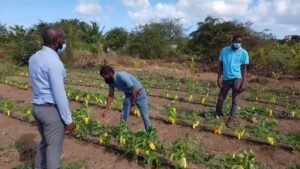Agricultural Education in Bosnia and Herzegovina: Empowering the Farming Future.Agriculture has long been a significant part of Bosnia and Herzegovina’s heritage and economy. With a diverse landscape and favorable climate, the country offers a rich potential for agricultural development. Agricultural education plays a vital role in harnessing this potential, empowering farmers with knowledge, skills, and innovation to ensure sustainable and prosperous agricultural practices. In this article, we will explore the history, current state, challenges, and opportunities of agricultural education in Bosnia and Herzegovina.
Agricultural Education in Bosnia and Herzegovina: Empowering the Farming Future
Historical Perspective
Agriculture has been a central part of Bosnian culture for centuries, with traditional farming practices handed down through generations. Historically, agricultural education in the region was often informal, with knowledge transmitted from experienced farmers to their children. With the establishment of formal education systems during the Austro-Hungarian and Ottoman periods, agriculture was introduced into school curricula.
After the Second World War, Bosnia and Herzegovina became a part of the Socialist Federal Republic of Yugoslavia. During this period, agriculture was highly subsidized and heavily regulated by the state. Agricultural education took on a collectivist approach, with a focus on large-scale state farms and cooperatives. However, after the breakup of Yugoslavia and the subsequent war, the agricultural sector faced significant challenges, leading to a decline in agricultural education and practices.

Current State of Agricultural Education
In the post-war period, Bosnia and Herzegovina embarked on rebuilding and restructuring its education system, including agricultural education. Today, agricultural education is offered at various levels, from vocational training to university programs. Some universities and faculties across the country offer specialized degrees in agriculture, agronomy, horticulture, and veterinary medicine.
Technical schools and agricultural colleges provide vocational education, equipping students with practical skills for work in the agricultural sector. These institutions often collaborate with agricultural enterprises, allowing students to gain real-world experience and connect with potential employers.
Challenges Facing Agricultural Education
Despite the progress made in agricultural education, Bosnia and Herzegovina still face several challenges that need to be addressed:
- Outdated Curriculum: Some educational programs may suffer from outdated curricula that do not align with the modern needs of the agricultural sector. There is a need to incorporate advancements in technology, sustainable practices, and market demands into the curriculum.
- Limited Funding: Agricultural education institutions often face financial constraints, limiting their ability to invest in infrastructure, equipment, and research. Adequate funding is essential to ensure the quality and relevance of agricultural education.
- Brain Drain: Many young people choose to emigrate to other countries in search of better economic opportunities, leaving a shortage of skilled and educated professionals in the agricultural sector.
- Low Enrollment: The allure of urban life and non-agricultural careers has led to a decline in enrollment in agricultural education programs, which hampers the growth and development of the sector.
- Gender Inequality: Women are underrepresented in the agricultural sector and face challenges in accessing agricultural education and training opportunities.
- Sustainable Practices: There is a need to promote sustainable agricultural practices and environmental stewardship among students and farmers, ensuring the long-term viability of the sector.

Opportunities and the Way Forward
Despite the challenges, there are several opportunities and strategies to enhance agricultural education in Bosnia and Herzegovina:
- Modernizing Curricula: Collaboration between agricultural education institutions, farmers, and industry stakeholders can lead to the development of modern and relevant curricula. Incorporating innovative techniques, sustainable practices, and market-oriented training can better prepare students for the agricultural workforce.
- Promoting Research and Development: Encouraging research and innovation in agriculture can lead to improved productivity, resource management, and sustainability. Agricultural education institutions should foster a research culture and engage students in practical research projects.
- Public-Private Partnerships: Collaboration between agricultural education institutions and private agricultural enterprises can provide students with practical training and job placement opportunities. These partnerships can also support the development of research and innovation in the sector.
- Attracting and Retaining Talent: Incentives and opportunities for students to gain work experience in the agricultural sector can help attract and retain talent. Programs that promote entrepreneurship and support young farmers in starting their own businesses can also be beneficial.
- Empowering Women in Agriculture: Efforts should be made to promote gender equality in agricultural education and the agricultural sector as a whole. Encouraging women’s participation in agricultural training and leadership roles can lead to more inclusive and sustainable agricultural practices.
- Integration of Technology: Integrating digital tools and technology into agricultural education can enhance learning outcomes and prepare students for the digital age of farming.

Conclusion
Agricultural education in Bosnia and Herzegovina holds the key to unlocking the country’s agricultural potential, ensuring food security, and driving economic growth. By addressing the challenges and capitalizing on opportunities, the country can empower its farming future. Through modernizing curricula, promoting research and innovation, fostering public-private partnerships, and supporting aspiring farmers, Bosnia and Herzegovina can build a skilled, sustainable, and thriving agricultural sector for generations to come. With strong agricultural education at its foundation, the nation can cultivate a brighter future for its farmers, its economy, and its people.
See more:
